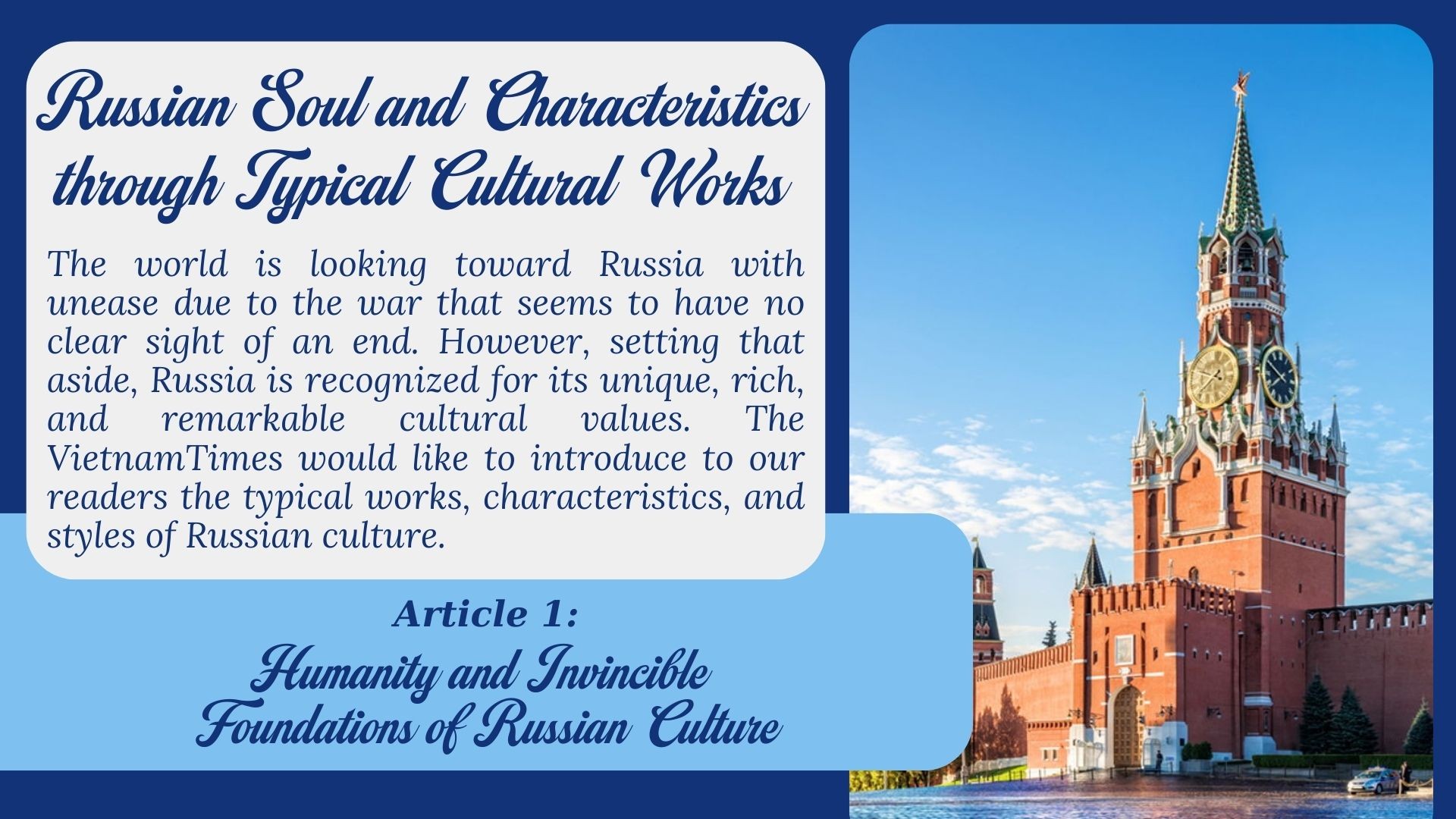
| Numerous perspectives seek to explain the underpinnings of this culture. Journalist and poet Hong Thanh Quang, who harbors a special fondness for Russia, believes that the essence of "humanity" and "invincibility" constitute the fundamental components of this nation's culture. |
 |
|
"While some Western perspectives may view Russian culture as unrelated to Europe, and some Russian scholars seek to "separate" their culture from the West, Russians themselves have never accepted the subordination or domination of their life values and culture. Throughout history, the world has witnessed the stature and value of Russia's tangible and intangible cultural works, scientific and technical accomplishments, cultural and artistic triumphs, and even political, military, and cultural triumphs. These cultural milestones have undoubtedly been shaped by numerous factors the two fundamental elements are the humanistic and the invincible spirits inherent in the people of Russia."
Journalist and poet Hong Thanh Quang at an interview with the VietnamTimes. (Photo: Dinh Hoa) |

|
Firstly, Russian culture is characterized by its tolerance, embracing a multitude of cultures, elements, and cultural values. It assimilates without eradicating or oppressing new cultural influences. Russia, a vast empire, is home to numerous ethnic groups and cultures coexisting harmoniously. With around 190 ethnic groups, Russia protects their rights and cultures through policies of autonomy. Despite Western attempts to sway former Soviet republics from Russia, the country's humanistic allure continues to resonate with many ethnicities. Russia prides itself on being a multi-ethnic and multi-faith society that upholds respect for diverse values as a fundamental tenet. Even amid economic and social hurdles, Russia remains a beacon for individuals from former Soviet republics seeking fresh opportunities. Moscow, in particular, has emerged as a favored destination for migrants from Central Asia.
Secondly, the Russian people have outstanding kindness and openness. I got this impression right with the first Russian I met. He was a soldier, about 18 years old, who drove us from the airport to the Military Academy. His kindness, friendliness, and sincerity left a warm feeling in me, so much so that I admire everything about him. I studied in Ulyanovsk, an idle province, with a humble scholarship, but fortunately, I had an “adoptive mother”. She is my classmate's mother. Every time when I had a day off, I came to visit her. She took care of me, taught, and talked to me like her own child. |
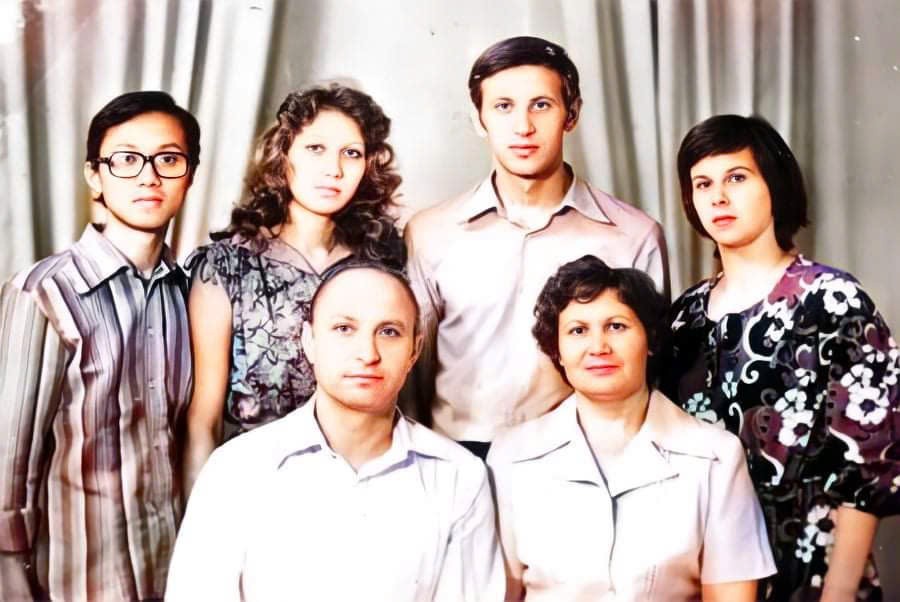
Hong Thanh Quang (far left) with his Russian "adoptive parents" in 1982. (Photo courtesy of Hong Thanh Quang)
| During my time in Russia, I met workers, students, librarians,… Whenever I mentioned Vietnam, they showed special affection and interest. However, after staying there for a long time, I realized that their love extends beyond just Vietnam. Many Russians treat foreigners very nicely. |

|
Hong Thanh Quang and a Tatar man in Crimea. (Photo: NVCC) In literature, masterpieces like Dostoevsky's "The Brothers Karamazov" and Tolstoy's "War and Peace" profoundly depict the humanistic values of the Russian populace. Similarly, in music, Tchaikovsky and Rachmaninoff have presented the world with emotive compositions that mirror the humanistic spirit of Russia. These creations, beyond their artistic merit, are saturated with humaneness and compassion; they embody the values of the heart and soul. Russian Orthodoxy, steeped in a long tradition, has consistently advocated for compassion and forgiveness. The Great Patriotic War against fascism during World War II stands as the most vivid testament to the Russian people's spirit of sacrifice and compassion. Despite interpretations suggesting the war was highly detrimental to Russia, the undeniable fact remains that Russia did not hesitate to make sacrifices to liberate and assist other nations. Russians take pride not only in their victories but also in the noble sacrifices made for the sake of their friends. |

|
Throughout human history, there have been numerous wars on a global scale. Notable among these were the devastating conquests, one led by Napoleon and the other by Hitler. They decimated nearly every nation that stood in opposition. Nevertheless, both were ultimately vanquished by the resilience of the Russian people. Such defeats often led to widespread destruction. It is the heroic and unyielding spirit that makes such remarkable victories possible in warfare. Throughout history, Russian culture, while often annexed, competed with, and seen as peripheral to Western civilization, has maintained its independence, self-sufficiency, and continuous growth, marked by distinctive and characteristic values and qualities. This is further exemplified by Russian literature, art, architecture, religion, as well as science and technology. Russia's spirit of independence and self-reliance also has a very special factor. That is the strength of natural resources. With an area of about 17 million km2, Russia is not only the largest country in the world but also possesses a rich treasure of natural resources. Russia's important resources include oil, gas, coal, and precious metals such as gold, platinum and other strategic minerals, all of which are rich in reserve. Thanks to the resources, Russia can be self-sufficient in many situations and influence and regulate global chess games. |
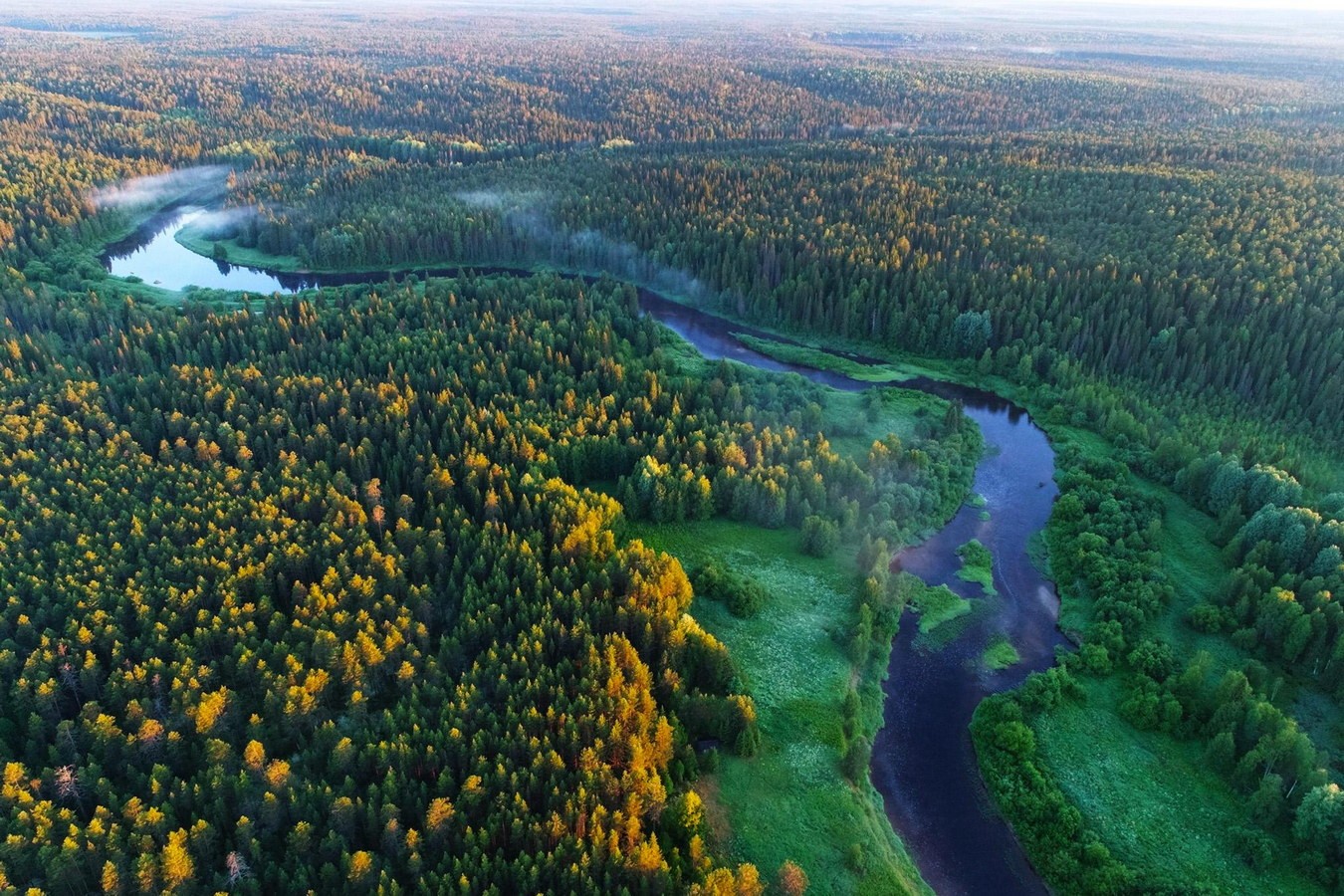
Russian Taiga forests seen from above. (Photo: Izvestia)
|
Russia boasts a varied ecosystem, encompassing climate zones ranging from the frigid Arctic to tropical plains and extensive Taiga forests. This variety in natural conditions fosters an advantageous setting for research and development across numerous fields, including agriculture and biotechnology. Regions like Siberia and the Arctic have considerable untapped potential for growth. Despite facing war and sanctions from the West, the Russian economy has not only adapted but also grown at a high rate. It shows Russia's invincible spirit and special self-reliance that amazes the world. |

|
I believe that Russian culture will continue to develop based on invincibility spirit and humanity values. Perhaps in terms of economic development and social model building, Russia has not achieved results and measurements that are considered brilliant in Western concepts. However, Russia will still grow in its own way, based on the mentioned core values.
In 2023, Hong Thanh Quang returned to visit his "adoptive parents" in Russia. (Photo: NVCC) In 2023, I revisited Russia and saw my "adoptive mother". She still lived in the same humble, old apartment building she has lived in since 1980. Yet, her spirit, determination, and kindness remain unwavering. This exemplifies how Russians, despite modest material circumstances, preserve their inherent qualities and steadfastness to their values, reflect the resilience and fortitude of the Russian character. - Thank you for the interview! |
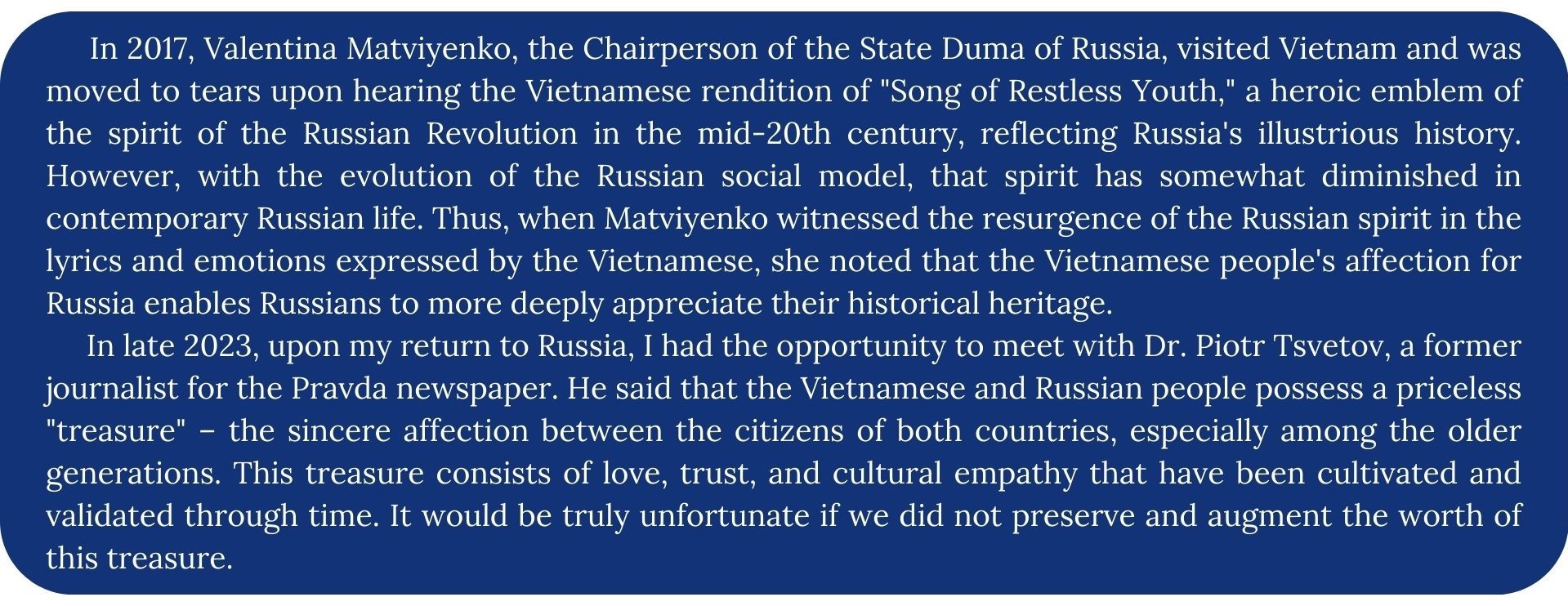 |
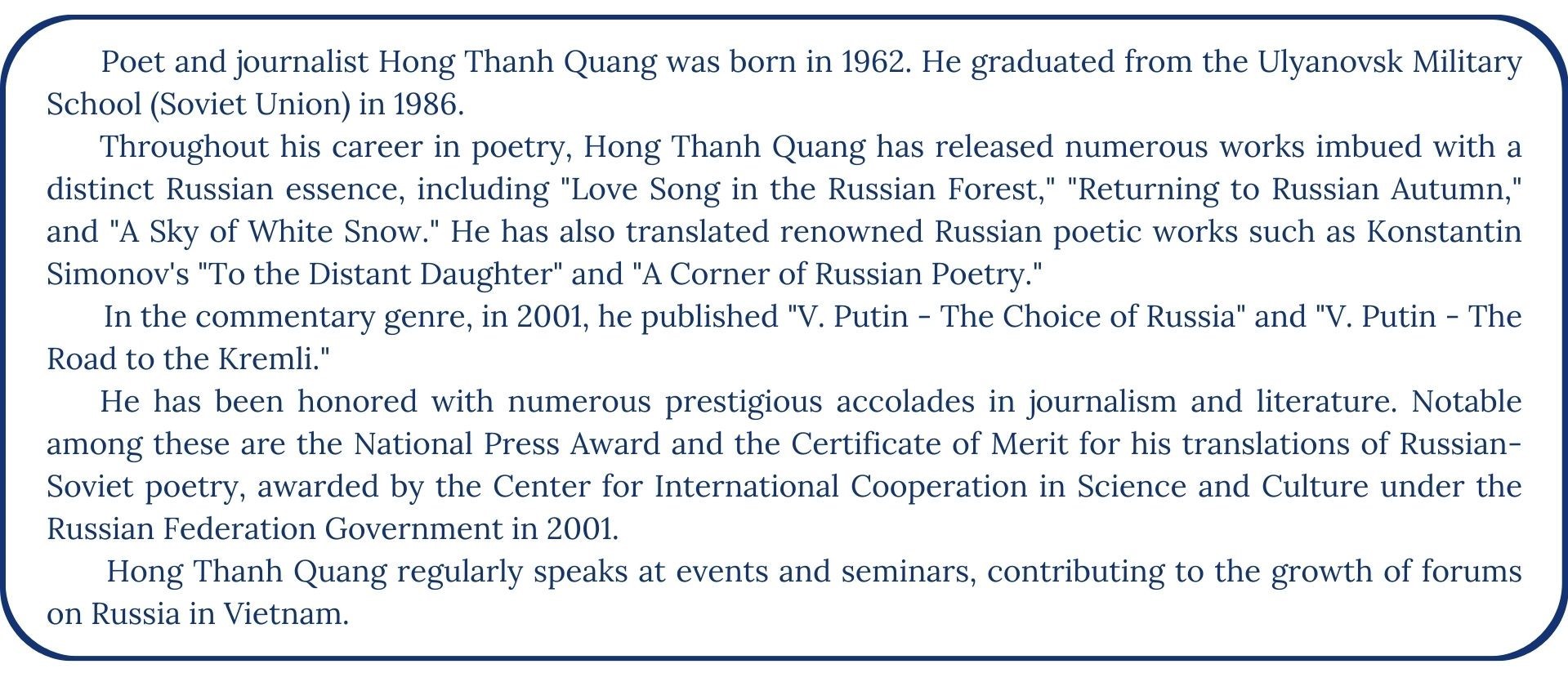 |
| VNT writers |